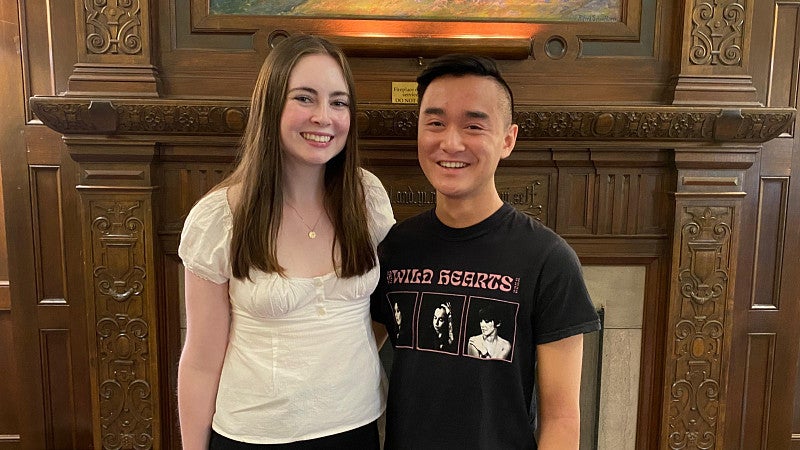
It took Cecelia Gibbons a moment to realize she had won.
As Kidd Program Director Brian Trapp read the finalists for the annual Walter and Nancy Kidd Memorial Writing Competition in Poetry and Fiction, Gibbons felt as if she wouldn’t place in the top three. But then she was shocked to hear her name at the April 27 contest.
“When I heard I won, I don't think my brain caught up with my body,” Gibbons said. “Everything was kind of a blur.”
Gibbons is one of two winners for the 2023 annual writing competition organized by the Department of Creative Writing’s Kidd Program. Phillip Chan won first place in poetry for “Ningbo West Street, Zhonzheng District.” Each winner received a $500 prize.
The competition is held annually during the spring term and is open to all undergraduates at the University of Oregon. The two genres, poetry and fiction, have three winners (first place, second place and third place). All winners receive a monetary award and a certificate that includes remarks from the competition judge in their genre.
Brian Trapp, Kidd Program director, said this year’s competition had nearly 100 submissions, adding, "We were astounded by the depth of talent on display from UO undergrad writers.”
“They made our judges’ job very difficult with so many worthy entries,” Trapp said. “It just speaks to the immense creative powers of our students as both storytellers and poets.”
Thomas Beller judged the fiction genre and remarked that Gibbons’ “Thursday’s Girl” was a particularly powerful story.
“With wit and precise language,” Beller said. “'Thursday’s Girl' captures the difficulty of family relationships and how they develop over time. The story manages to be precise and far-reaching. The voice is so strong and convincing that we’re eager to follow this narrator to the end and beyond.”
The two first-place winners, Gibbons and Chan, are also in the Kidd Program, the year-long specialized creative writing program for undergrads unrelated to the Kidd Prize. The Kidd Prize is open to all undergrad students.
Grief — and how it affects someone — is what inspired Gibbons to write “Thursday’s Girl.”
As she wrote, the story shifted and changed, which led her to the idea of the story.
“Initially, the story began with the main character Lucy locking herself in her apartment upon hearing about her father's death,” Gibbons explained. “The original draft heavily focused on her relationship with her father, but upon hearing feedback from my instructor and my classmates, we decided the true emotional core of the story was the sibling relationship.”
—By McKenzie Days, College of Arts and Sciences
